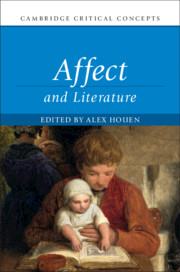Book contents
- Affect and Literature
- Cambridge Critical Concepts
- Affect and Literature
- Copyright page
- Contents
- Notes on Contributors
- Introduction
- I Origins
- II Developments
- Chapter 11 Feeling Feelings in Early Modern England
- Chapter 12 Laughable Poetry
- Chapter 13 Modernism, Formal Innovation, and Affect in some Contemporary Irish Novels
- Chapter 14 The Antihumanist Tone
- Chapter 15 Bette Davis’s Eyes and Minoritarian Survival: Camp, Melodrama, and Spectatorship
- Chapter 16 Affective Form
- Chapter 17 Subaltern Affects
- III Applications
- Index
Chapter 17 - Subaltern Affects
from II - Developments
Published online by Cambridge University Press: 16 January 2020
- Affect and Literature
- Cambridge Critical Concepts
- Affect and Literature
- Copyright page
- Contents
- Notes on Contributors
- Introduction
- I Origins
- II Developments
- Chapter 11 Feeling Feelings in Early Modern England
- Chapter 12 Laughable Poetry
- Chapter 13 Modernism, Formal Innovation, and Affect in some Contemporary Irish Novels
- Chapter 14 The Antihumanist Tone
- Chapter 15 Bette Davis’s Eyes and Minoritarian Survival: Camp, Melodrama, and Spectatorship
- Chapter 16 Affective Form
- Chapter 17 Subaltern Affects
- III Applications
- Index
Summary
If affect theory is principally concerned to account for the visceral forces and intensities that relate human and non-human bodies, how might it help to make sense of the force and intensity of capitalist cultures of accumulation and extraction as they are lived, felt, and understood by subaltern bodies living and dying in the Global South? In what ways might the transmission of affect associated with the political and economic legacies of European colonialism shape the understanding of such contemporary cultures of accumulation, extraction, and dispossession? And how might technologies of representation, such as printed books, help to illuminate the ways in which the sign systems of the market economy, the media, and the state affect the bodies and lived environments of those who feel the slow violence of debt, capital accumulation, and dispossession most acutely? This chapter tries to address these questions by considering how subaltern histories are registered affectively through the transmission of human remains. Building on poststructuralist theories of subaltern affect and psychoanalytic accounts of affect in the decolonial thought of Frantz Fanon, it suggests that the histories of those whose lives are deemed without value and denied expression in hegemonic forms of speech and representation are nevertheless transmitted in the embodied experiences of subalternity.
- Type
- Chapter
- Information
- Affect and Literature , pp. 317 - 334Publisher: Cambridge University PressPrint publication year: 2020
- 1
- Cited by

